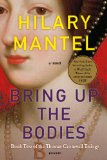Summary | Excerpt | Reading Guide | Reviews | Beyond the Book | Readalikes | Genres & Themes | Author Bio

Wolf Hall Trilogy #2
by Hilary MantelYet he tries not to say 'at my age': not in his waking life. On a good day he thinks he has twenty years left. He often thinks he will see Henry out, though strictly it is not allowed to have that kind of thought; there is a law against speculating about the term of the king's life, though Henry has been a life-long student of inventive ways to die. There have been several hunting accidents. When he was still a minor the council forbade him to joust, but he did it anyway, face hidden by his helmet and his armour without device, proving himself again and again the strongest man on the field. In battle against the French he has taken the honours, and his nature, as he often mentions, is warlike; no doubt he would be known as Henry the Valiant, except Thomas Cromwell says he can't afford a war. Cost is not the whole consideration: what becomes of England if Henry dies? He was twenty years married to Katherine, this autumn it will be three with Anne, nothing to show but a daughter with each and a churchyard's worth of dead babies, some half-formed and christened in blood, some born alive but dead within hours, within days, within weeks at most. All the turmoil, the scandal, to make the second marriage, and still. Still Henry has no son to follow him. He has a bastard, Harry Duke of Richmond, a fine boy of sixteen: but what use to him is a bastard? What use is Anne's child, the infant Elizabeth? Some special mechanism may have to be created so Harry Richmond can reign, if anything but good should come to his father. He, Thomas Cromwell, stands very well with the young duke; but this dynasty, still new as kingship goes, is not secure enough to survive such a course. The Plantagenets were kings once and they think they will kings be again; they think the Tudors are an interlude. The old families of England are restless and ready to press their claim, especially since Henry broke with Rome; they bow the knee, but they are plotting. He can almost hear them, hidden among the trees.
You may find a bride in the forest, old Seymour had said. When he closes his eyes she slides behind them, veiled in cobwebs and splashed with dew. Her feet are bare, entwined in roots, her feather hair flies into the branches; her finger, beckoning, is a curled leaf. She points to him, as sleep overtakes him. His inner voice mocks him now: you thought you were going to get a holiday at Wolf Hall. You thought there would be nothing to do here except the usual business, war and peace, famine, traitorous connivance; a failing harvest, a stubborn populace; plague ravaging London, and the king losing his shirt at cards. You were prepared for that.
At the edge of his inner vision, behind his closed eyes, he senses something in the act of becoming. It will arrive with morning light; something shifting and breathing, its form disguised in a copse or grove.
Before he sleeps he thinks of the king's hat on a midnight tree, roosting like a bird from paradise.
Next day, so as not to tire the ladies, they cut short the day's sport, and return early to Wolf Hall.
For him, it is a chance to put off his riding clothes and get among the dispatches. He has hopes that the king will sit for an hour and listen to what he needs to tell him. But Henry says, 'Lady Jane, will you walk in the garden with me?'
She is at once on her feet; but frowning, as if trying to make sense of it. Her lips move, she all but repeats his words: Walk … Jane? … In the garden?
Oh yes, of course, honoured. Her hand, a petal, hovers above his sleeve; then it descends, and flesh grazes embroidery.
There are three gardens at Wolf Hall, and they call them the great paled garden, the old lady's garden and the young lady's garden. When he asks who they were, no one remembers; the old lady and the young lady are dust long ago, no difference between them now. He remembers his dream: the bride made of root fibre, the bride made of mould.
Copyright © 2012 by Hilary Mantel




Silent gratitude isn't much use to anyone
Click Here to find out who said this, as well as discovering other famous literary quotes!
Your guide toexceptional books
BookBrowse seeks out and recommends the best in contemporary fiction and nonfiction—books that not only engage and entertain but also deepen our understanding of ourselves and the world around us.